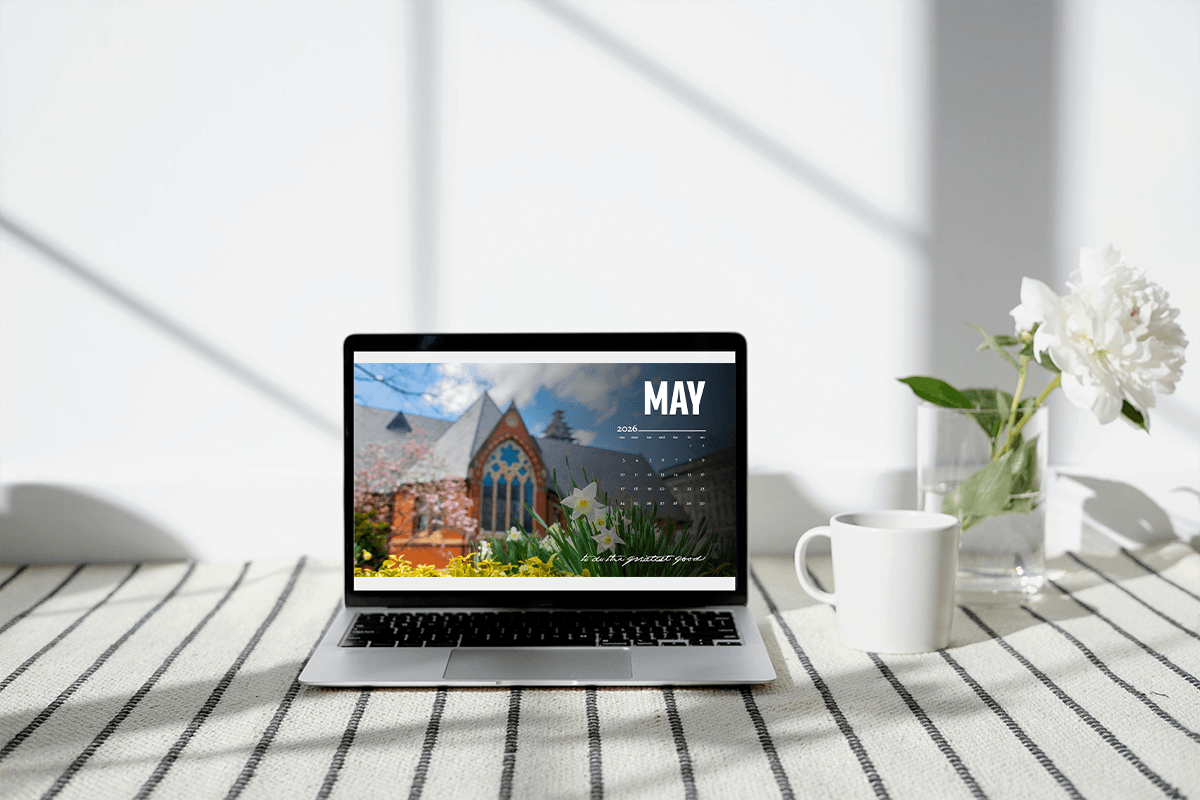When 2020 graduates gather online for the Class of 2020 Celebration on Sunday, June 13, they will be Zooming in from locations across the globe—from Brooklyn to Seattle and from Tel Aviv to Tanzania. When these seniors left campus in March 2020, few of them realized they would not be returning to campus for more than a year.
The Class of 2020 embarked on their postbaccalaureate careers in a time of huge uncertainty, in the midst of a global pandemic. Many returned to their childhood homes. Most have started their careers working from remote locations, meeting with colleagues and mentors via Zoom. They have had to let go of where they thought they would be now and learn to embrace a vastly different year, work and social life, and global landscape.
To honor their journeys, we reached out to eight members of the Class of 2020 who agreed to share candid reflections on their lives over this past year. These alumni live in very different locations and circumstances, but they share a common reality. The global pandemic has impacted each of them in profound ways, causing them to put their pre-pandemic plans on pause, to take stock, and—in many cases—to rethink their priorities. They’ve learned to let go of what might have been and, in so doing, they’ve grown stronger and wiser in their ability to shape what might be. We hope you are inspired by their stories of resilience as they learned to do what Jelani Taylor ’20 calls, “play it different.”
Moving from football star to rap artist: Jelani Taylor ’20
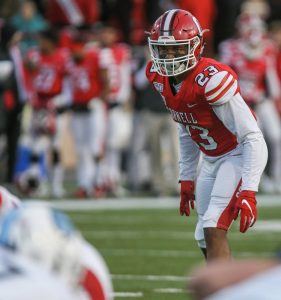
“This past year feels like it was a gift in disguise.”
Jelani Taylor ’20 says that where he grew up, in Flint, Michigan, there were two stereotypical career paths for Black males: “play ball or rap.” Jelani embraced both, playing football in school and spending his weekends composing rap songs with his brother. He says that rap music was a great alternative to spending time on the streets, and he credits sports and his love of music with keeping him out of trouble.
Jelani attended the School of Hotel Administration and won numerous accolades on the football field during his Cornell career. He was on track to pursue his dream of playing in the NFL, after graduating early to attend training in Dallas in early 2020. Jelani returned to campus in March 2020 to attend two pro days, one at Cornell and one in NYC. Both were cancelled due to the pandemic and Jelani’s football dreams were forever changed.
He continued training for the next few months, first at Cornell and then at his girlfriend’s place near Kent State University in Ohio. Jelani says that the six+ hours a day of training, at the intensity required to play professional football, is something that he had to re-evaluate once he entered the workforce. This period of reflection caused him to rethink his plans. “I did a lot of self-discovery and found closure with that stage of my football life,” Jelani says.
“When I reflected on football and what I loved about it,” he explains, “I realized that it was about using words to inspire others.” He recognized that his love of words, as expressed through rap music, is where his true passion lies. “When I rap, the feeling is like when I first picked up a football,” he says.
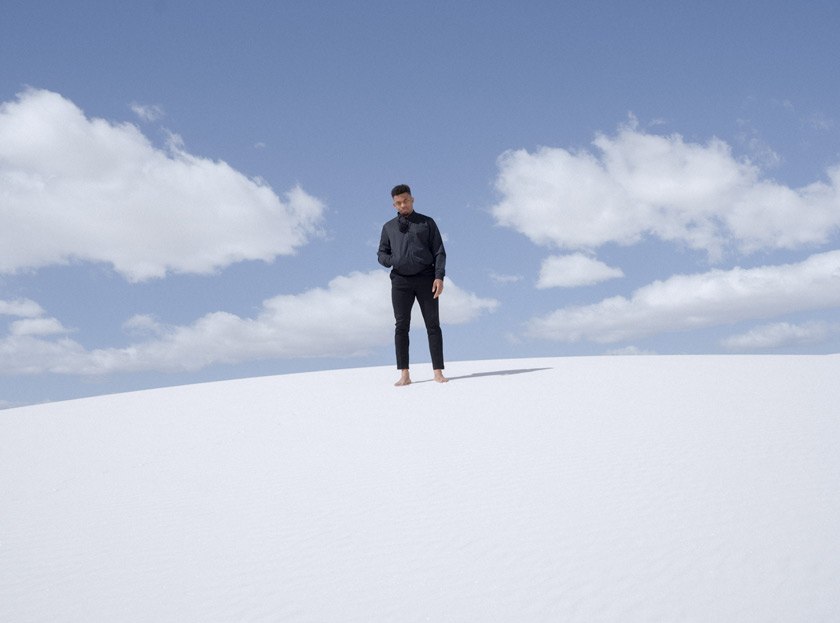
Early in the pandemic, Jelani began taking music more seriously and recording original songs. “Right now, everything is still in the idea phase,” he says. “I’m doing the music and making a plan, building the relationships so I can launch,” he adds.
In the meantime, Jelani is living in Seattle with his girlfriend and working as a consultant for McKinsey & Company. He enjoys the diversity of projects he’s been assigned to so far, including a merger and a procurement project.
Jelani’s goal for the next year is “to come closer to the man I want to be. This is holistic and includes every facet of my life,” he says.
“I’m going through a lot of unlearning,” he adds. “Unlearning involves going back and looking at the miseducation we’ve had, and analyzing the subconscious and unconscious things we see and hear. For me as a Black man, this includes toxic masculinity, living in a patriarchy, and racism.”
Jelani composed this rap in honor of his birthday in April 2021.
As Jelani looks back at what he and his Cornell football friends lost in 2020—the chance to play in the NFL—he feels that all of them have landed on their feet. One is coaching football and the others are working as business consultants. Jelani says that, in spite of the challenges, he’s grateful for the lessons he’s learned during the pandemic.
“This past year feels like it was a gift in disguise,” he says. “I would not have said that at the start, but, in hindsight—it was.”
Gaining perspective in Tel Aviv: Jillian Shapiro ’20
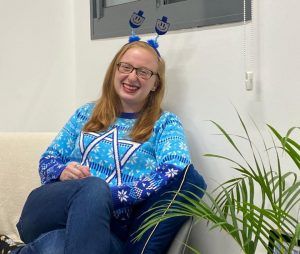
“I made the decision to move to Israel in the middle of a pandemic, and it has been a wild ride!”
In her junior year, Jillian Shapiro ’20 served as president of Cornell Hillel. “Judaism is a huge part of my identity,” Jillian says, “and I had always wanted to study or live in Israel.”
After completing her undergrad degree in biological sciences in 2020, she found a NYS program that allows medical school students to study in Israel and earn an American degree. In fall 2020, Jillian began her studies at the Sackler School of Medicine at Tel Aviv University. “I made the decision to move to Israel in the middle of a pandemic, and it has been a wild ride!” she says.
When she first arrived, Jillian recalls feeling like life in Tel Aviv was “almost back to normal” compared to life in the States. “Israel has been a model for how to effectively and safely vaccinate a population,” she says, “to the point where COVID-19 almost started to feel like old news.” Jillian reports that restaurants, bars, and museums were all open. “If I didn’t spend all day studying, I definitely would have been joining in, with my green passport in hand and my mask on,” she says.
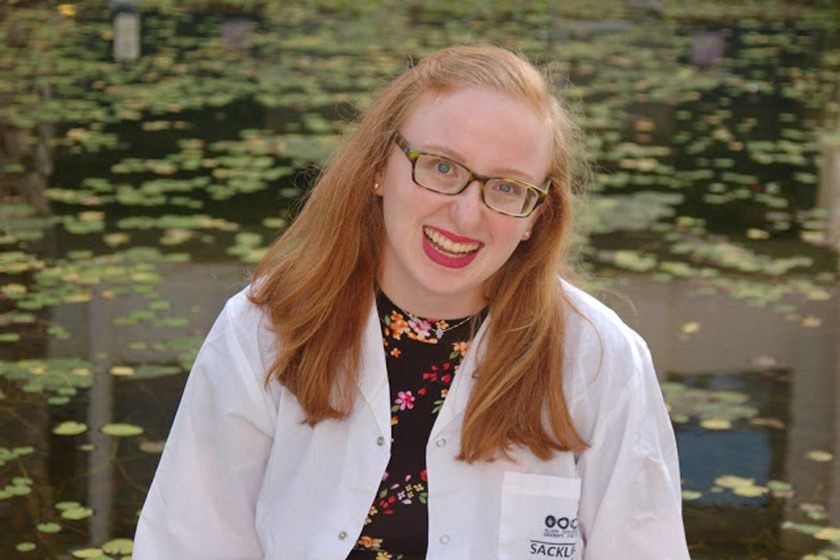
Jillian hasn’t been able to see her family back home in Boston since she moved to Israel, but she says she has connected with a distant cousin who lives there. “I never knew her until moving here—now I’m part of the family,” she says.
A few weeks ago, Jillian’s life in Tel Aviv changed dramatically. When fighting broke out in early May, her classes transitioned from in-person to online. “Israel is really resilient in times like this,” she says. “They want to continue classes in person as soon as it’s safe to do so,” she adds.
During the past few weeks, Jillian took refuge in bomb shelters whenever the sirens went off. “I was in and out of them while rockets were fired throughout the country nonstop,” she says. “Before, my biggest problem was making sure to pack a few extra masks in my purse when I went to the grocery store. Now, I take a fully packed bag and make sure to locate my nearest bomb shelter before I go out,” she says.
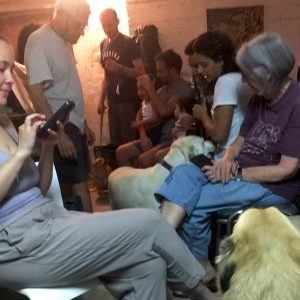
Jillian says that the apartment buildings in her part of the city are left unlocked and they all contain bomb shelters or fortified stairwells. When the sirens sound, residents head to the nearest shelter. “With a communal shelter, what you see is what you get,” she says. “The one in my building is actually someone’s apartment that doubles as a shelter. It’s not too bad; there’s a bathroom and I leave my blanket there in case it’s chilly,” she adds.
Her experiences living through the recent conflict have given her a new perspective on the pandemic. “Before this, I thought I had very little control over the situation in the world: with the pandemic looming, there was so much uncertainty,” she says.
“It wasn’t until now—being woken up in the middle of the night to go to a bomb shelter—that I’ve realized how it feels to have no power. But we do have the power to protect ourselves and our loved ones during this pandemic,” Jillian says. “We have the ability to vaccinate ourselves and wear masks, to social distance and self-isolate, all of which can help keep your loved ones safe and healthy,” she adds.
Making meaning in Ithaca: John Sullivan Baker ’20
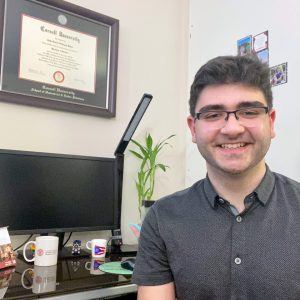
“It wasn’t easy at first to create structure and routine without physically going into the office, but I’ve learned a lot by having to adapt.”
John Sullivan Baker ’20 had intended to head straight to law school after graduation, but decided instead to defer his acceptance for a year and move back to Ithaca. He has spent the past year living in Collegetown.
“Although deciding to defer wasn’t easy, I’m so glad I did it,” John says. “Since my senior year was cut short, I’m lucky to have had an extra year in Ithaca with my sister, my girlfriend, and my friends. On top of this, I’ve been able to get more work experience, save money, and recharge before jumping back into school,” he adds.
John has been working remotely as a research associate for a boutique consulting firm called High Lantern Group. The main focus of his work has been Alzheimer’s diagnosis, treatment, and care. John has analyzed dementia policies around the world, written about patient experiences with the behavioral and psychological symptoms of Alzheimer’s, and lobbied the EU and G20 to better address the dementia crisis.
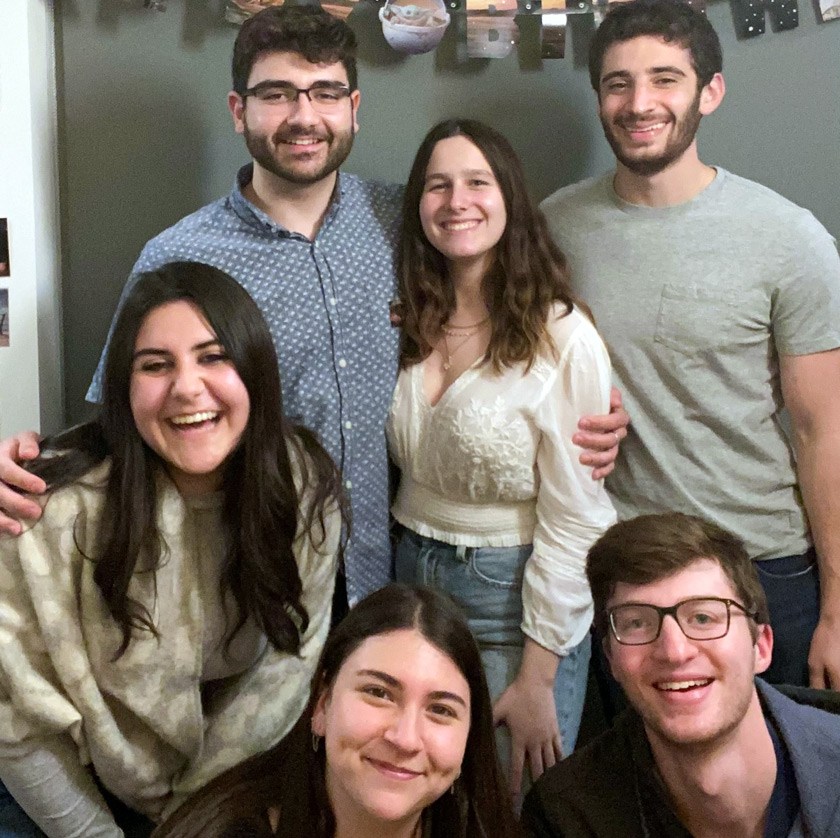
“About 90 percent of Alzheimer’s genetic research has studied white populations of Western European descent, even though about 90 percent of the world’s population is not of white Western European heritage,” John explains.
To change this, he has been working with the Davos Alzheimer’s Collaborative (DAC), which was officially launched at the World Economic Forum in January 2021. “DAC aims to speed the development of new treatments, reduce the crushing global costs of dementia ($818 billion in 2015), and ensure that the diversity of the world’s population is represented in clinical trials,” John says. “It’s been very fulfilling to contribute to a project that’s simultaneously advancing scientific progress and equity,” he adds.
According to John, no new medications to treat Alzheimer’s have been approved by the FDA since 2003. But several new therapies, which could potentially slow cognitive decline in patients, are currently undergoing clinical trials. “This would be a huge step forward,” John says, “so it’s a really exciting time to be working in the Alzheimer’s space.”
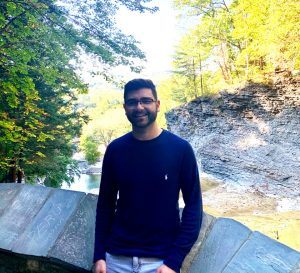
John found his position, which is based out of High Lantern’s Philadelphia office, online, and he’s never met his team members in person. “It was hard at first to create structure and routine without physically going into the office, but I’ve learned a lot by having to adapt,” he says. “Although it hasn’t always been easy, I feel like an important part of the team, and I appreciate the flexibility that a remote schedule gives me.”
John has taken advantage of this flexibility to spend more time outdoors, visiting all the parks, waterfalls, and trails he never had time to explore as an undergrad. “I only visited the Botanic Gardens once or twice while I was a student, but now it’s my favorite place to go jogging. I also really enjoy hiking around Six Mile Creek and Buttermilk Falls State Park, two areas I didn’t get to check off my senior year bucket list before the pandemic hit,” he says.
Deepening connection: Maya Cutforth ’20
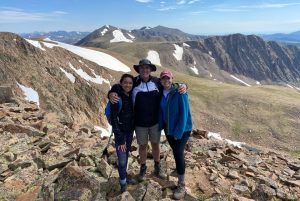
“I’m lucky to have a supportive circle of people who are honest when things are going well and when they aren’t, too.”
Maya Cutforth ’20 spent the first six months of the pandemic at home with her family in Colorado. “I come from a blended family and was able to bond with my step-siblings in a way that we were not able to while all in college,” she says. “I spent time reflecting on how my family has changed and on how I changed as an undergraduate,” she says.
“During the pandemic, my friends and I spent time Facetiming (many of us from our childhood bedrooms) and talking about our feelings, our sense of loss from our senior year, and our concern for the future,” Maya says, adding, “I’m thankful that so many friends, professors, and peers from Cornell taught me that being open and honest deepens your relationships, especially when things don’t go the way you expect.”
Since October 2020, Maya has been living in Buffalo, NY with her roommate, Claire Noack ’20. She says that Claire has been an incredible friend. “Whenever I’m having a hard time at work, missing family, or just not feeling happy,” Maya says, “Claire is quick to comfort me. She’s shown me that having one person who is there for you unconditionally can make all of the difference.”
Maya and Claire enjoyed cooking together, and Maya has reconnected to her Filipino heritage by teaching herself to cook a few traditional dishes. “I highly recommend looking up bilo-bilo if you’re interested in trying out a Filipino dessert!” she says.
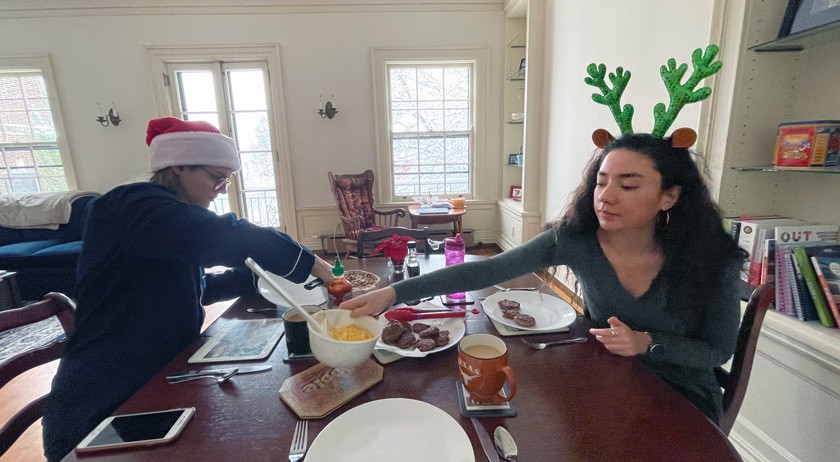
Maya works remotely as a diversity, equity, and inclusion (DEI) and talent acquisition specialist for M&T Bank. She shares that she had no prior corporate experience before starting at the bank, and that she was quite nervous at first. Cornellians at the bank reached out to Maya during her onboarding process. “Within my first week of virtual work, I received multiple emails from Cornell alumni at the bank,” she says. “Their kindness and welcoming attitudes helped me adjust, and I check-in with them regularly still.”
“I wasn’t quite sure what a job in DEI within financial services would be like,” she says, adding “I’ve come to see that there is a large need for this type of work.”
Maya also works as a DEI consultant for an educational tech startup called ParentPowered. “I have learned that curiosity, uncertainty, and courage are all necessary components to growth for any organization,” she says. “Through both of these remote roles, I’ve developed connections with coworkers across the country and gained confidence as a young professional.”
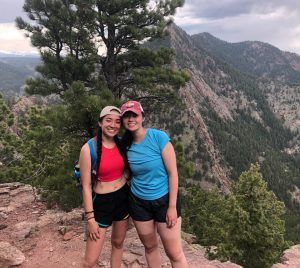
Her willingness to reach out to others for connection and support has helped Maya cope with the challenges of working remotely and remaining socially isolated from friends and family. “I begin my day sipping tea on the couch, and I usually call my sister as she walks to work in Washington, DC,” Maya says. “I’ve been very fortunate to stay in touch with my family and friends virtually during the past year. I’m lucky to have a supportive circle of people who are honest when things are going well and when they aren’t going well, too,” she adds.
Maya also keeps in close contact with her Cornell family. “I’m thankful to have Cornell friends who continue to help me be the best version of myself,” she says.
She treasures her special connection with John Nixon ’53, a generous alumnus who provided scholarship assistance for Maya during her time at Cornell. Maya and John have continued to correspond, and she refers to him as her pen pal. “To be quite frank, I think that we helped each other through our loneliness and ponderings in a time where I was only seeing my family, and he was confined to his apartment in his senior living facility,” Maya shares. “I am very grateful to him for continually taking an interest in my life and sharing with me moments from his,” she says.
Finding the silver linings: Yifan Li ’20
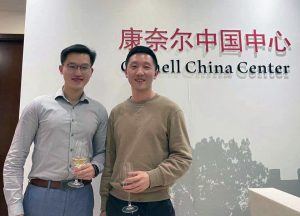
“This time has taught me to always find some joy, even during bad times.”
Yifan Li ’20 is looking forward to returning to Ithaca from his home in Beijing, China to retrieve the belongings he left here when campus closed in March 2020.
“I really miss Ithaca, especially in spring,” Yifan says. “I miss lying on the slope on the last day of class and eating rice noodles at Trillium Dining Hall.”
He has reunited with Cornell friends at the Cornell China Center, where they congregate to attend social events, listen to notable alumni, and meet with other Cornellians. “We just had a wine tasting event at the China Center, which was similar to the wine classes I took at the Hotel School in my senior year,” Yifan says. “It’s been very fun to mingle with alumni during their mixers and holiday events,” he adds.
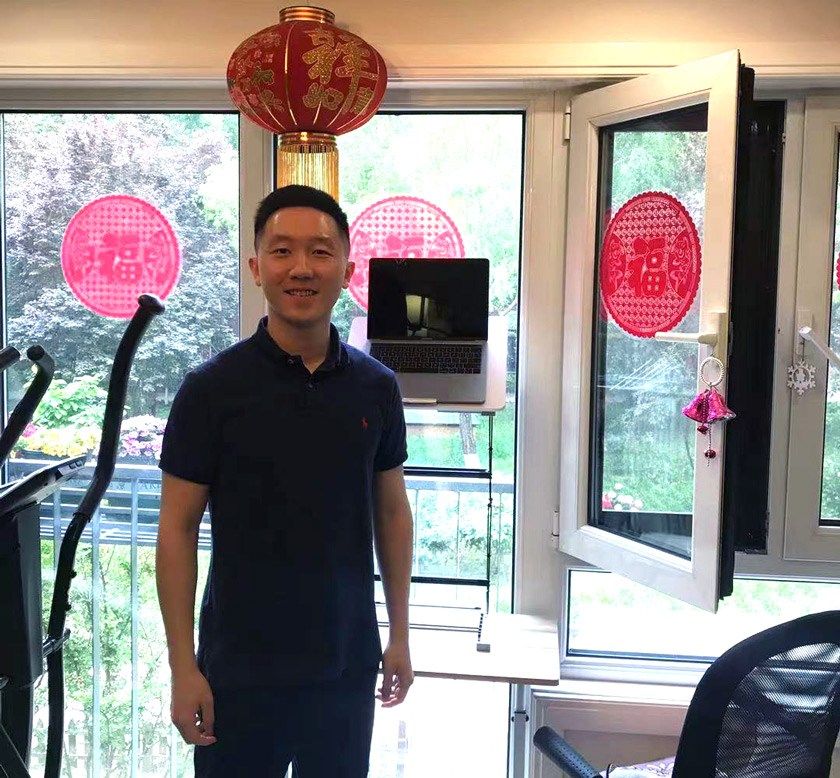
Yifan has been attending online classes at Columbia University, where he is working toward a masters of public policy degree. He admits that the 12-hour time difference has been brutal: “I usually start my online classes at 9:00 p.m. and try to schedule most of my classes before 1:00 a.m.,” he says, so he can get some sleep.
“I don’t have a chance to meet my classmates and utilize the resources the university offers,” Yifan says. “However, I think as long as I lower my expectations, I can actually enjoy my online classes at Columbia,” he adds.
He spends his days studying in Beijing coffee shops. Yifan has enjoyed the opportunity to explore his hometown. “It’s been a long time since I’ve had a chance to tour Beijing,” he says, “and I’ve found many good places to eat and have fun.”
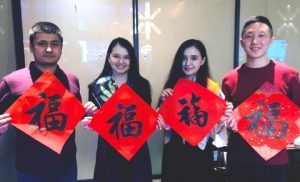
He’s also taken several online lectures and classes. “I took this opportunity to enrich my knowledge of energy, the environment, international relations, and a lot of subjects that I’m interested in,” he says. Yifan studied government and history at Cornell, and when he completes his master’s degree, he hopes to work in the energy and environmental sectors, bridging the U.S. and China.
Yifan says that life is almost back to normal in Beijing. “Most people are fully vaccinated,” he explains, “but some residents still wear masks both indoors and outdoors, by choice. People are still cautious and prepared for some emergent cases,” he adds.
Yifan has taken advantage of this time to travel with his family, and he recently accompanied his father to visit his father’s hometown in Shanxi. “I finally had the chance to spend time with my family. It has been four years since I celebrated the Chinese New Year with my parents at home,” he explains.
Yifan is very proud of his most recent pandemic accomplishment: he has learned to swim the butterfly stroke!
“I learned there will always be some silver linings,” Yifan says. “This time has taught me to always find some joy, even during bad times.”
Yifan recently obtained a visa to travel from Beijing to NYC, and he is very much looking forward to returning to the U.S. in August 2021 to continue his studies.
Being present: Valencia Lambert ’20
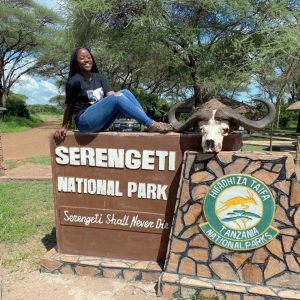
“Now, I simply try to enjoy the present!”
Valencia Lambert ’20 says that for the majority of her life she has been focused on the future. When weighing her options, she would ask herself: “Does it fit with my future plans? Will I regret this decision? Will it benefit me in the future?”
The pandemic brought huge uncertainty about the future and caused Valencia to refocus her attention on the present moment—a space where she has more control over the outcomes.
“My friend once told me that some things are temporary: whether it be a friendship or a job,” Valencia says, “and that’s okay. As long as you’re happy with it at the moment, it’s worth doing. During this pandemic, having such a mindset is quite beneficial,” she adds. “Now, I simply try to enjoy the present!”
At the start of the pandemic, Valencia returned home to Tanzania. “I think Tanzania’s response to the pandemic was very different from many other countries,” she explains. “We didn’t have a countrywide lockdown or any quarantine requirements in place when I arrived in July, and most activities were running as usual. It’s hard to assess how the pandemic has affected my community because there haven’t been any statistics published regarding the situation since May 2020,” she adds.
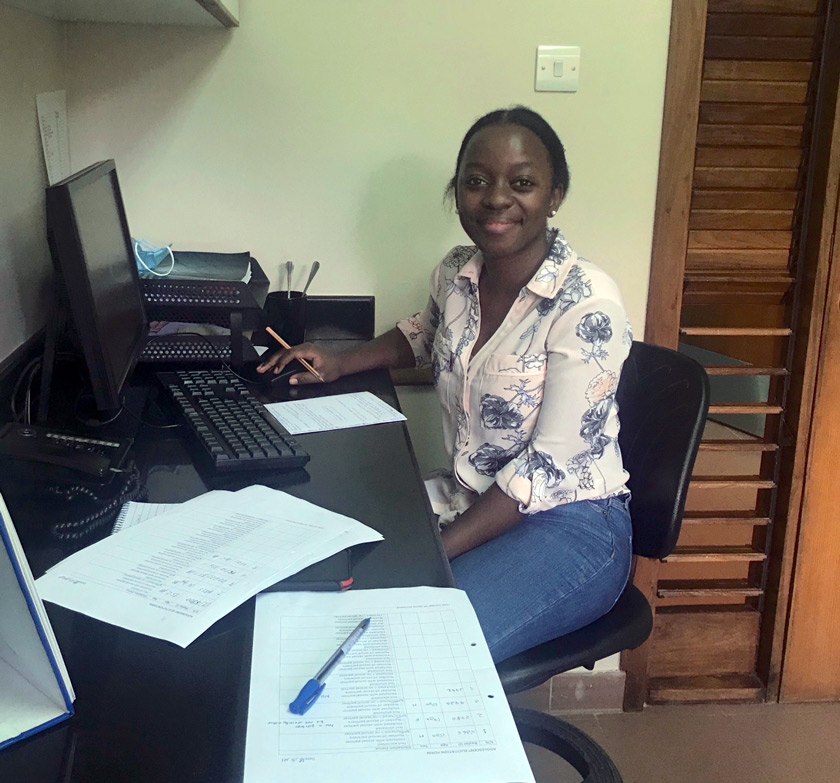
Valencia currently works as a research assistant at the Weill Cornell Medicine Center for Global Health in Tanzania. Her position is based at Mwanza Intervention Trials Unit and the National Institute for Medical Research, and her research is primarily focused on women’s health, female genital schistosomiasis, and family planning. Valencia also volunteers twice a week at Baylor College of Medicine Children’s Foundation in Mwanza, where she has the opportunity to shadow pediatricians and gain some pre-medical experience.
She says that, so far, she hasn’t encountered any patients with COVID-19. “We take precautions to assess each patient who attends the clinic, but I haven’t come into contact with any positively identified COVID patient,” she says.
Valencia hopes to enroll in medical school in the fall. Her long-term goal is to work as a physician-scientist, conducting public health research in sub-Saharan Africa while practicing medicine as a physician.
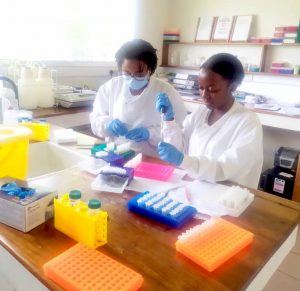
In the short-term, Valencia has been enjoying exploring her own backyard in Tanzania. Last Christmas, she went on a safari with her family to Serengeti National Park and Ngorongoro Conservation Area. “Despite the fact that I am Tanzanian, I had never actually been to these two highly ranked tourist destinations,” she says. “I made it a priority to embrace domestic tourism, especially during this pandemic. It was an amazing experience, and I would definitely go back!”
In her free time, Valencia enjoys hanging out with friends, watching movies on Netflix, and playing Zelda or Animal Crossing on her Nintendo Switch. She feels that her family and friends have been a source of strength for her during the past year. “Knowing that they are healthy and well keeps me at ease,” she says.
Healing and starting anew: Cole Johnston ’20
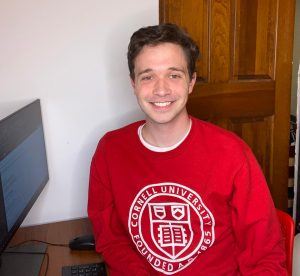
“I am unbelievably blessed to be a Cornell alumnus.”
In January 2021, Cole Johnston ’20 joined Alumni Affairs and Development in the role of Program Assistant for U.S. Regional Engagement. Cole’s job involves handling logistics around event registration, maintaining club websites, and managing email campaigns, as well as broad engagement with alumni to advance Cornell’s mission.
“I see myself as a bridge between the university staff and Cornell alumni,” Cole says. “On a deeper level, my job is to listen to what alumni are saying—what is or isn’t working well in their volunteer roles? What are their frustrations or aspirations as it relates to the university? Ultimately,” he says, “my job is to understand our alumni and meet them where they are to foster stronger relationships within our community.”
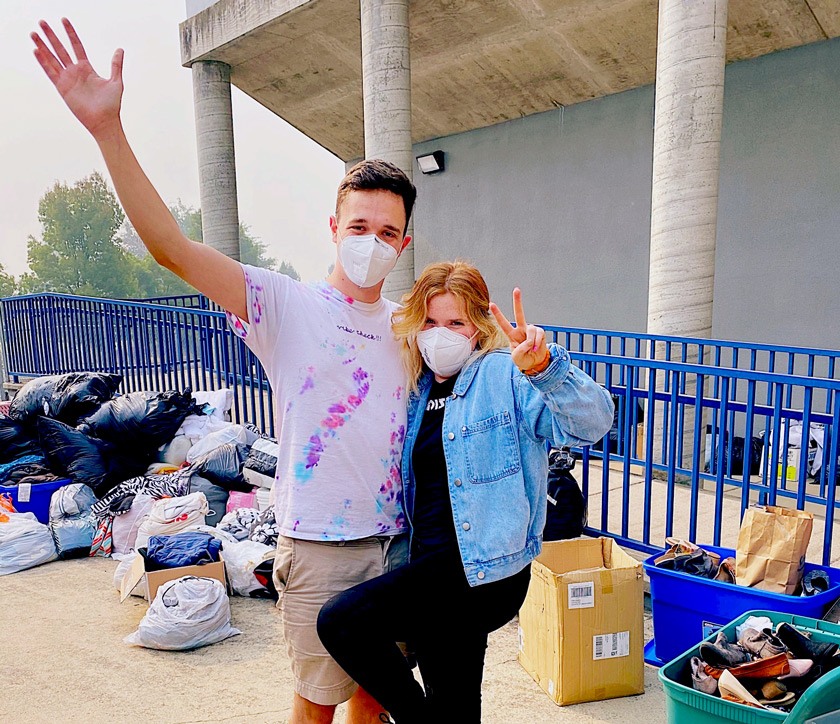
This is a big role and Cole has spent years preparing for it. He earned his Cornell degree in International Agriculture and Rural Development with a minor in Inequality Studies. Cole was a facilitator and TA for the Intergroup Dialogue Project (IDP), a campus tour guide, and was very active with the Interfraternity Council (among many other student involvements). Cole attended the Cornell Alumni Leadership Conference in 2019, where he facilitated IDP sessions for participants.
Cole put his Cornell education and IDP facilitation skills to good use in summer 2020, when he was living at home in Oregon. The Almeda and Obenchain fires ravaged his community, burning more than 2,000 homes in one day.
“I applied the training I received through the Intergroup Dialogue Project to organize a coalition of young people in my area to raise $10,000 in direct cash relief for those affected by the natural disaster and manage a community distribution point for essential supplies like soaps, baby formula, non-perishable foods and drinking water, and temporary shelter,” Cole says. “IDP equipped me with the confidence and frameworks to affect material realities 2,500 miles from the Ithaca campus. I am incredibly grateful to the people from the Cornell community who donated their time and energy to provide relief to people in my hometown,” he says, adding, “I am unbelievably blessed to be a Cornell alumnus.”
Cole shares that his past year has involved tremendous loss. “In the beginning of March 2020, I would’ve described my life as almost perfect,” he says. “I had a loving boyfriend, incredible job opportunities, an exciting social life, stable mental health, and all four of my grandparents. Piece by piece, this crisis took away all of those things.”
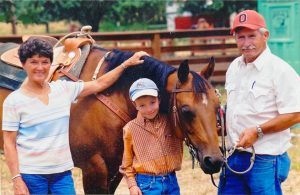
His grandfather, whom he describes as “one of my biggest supporters and role models” died of complications from COVID-19 on New Year’s Eve 2020, and his grandmother’s health rapidly degenerated after losing her husband.
“The grief I feel is unlike anything I’ve had to deal with before,” Cole says. “What I think many people don’t understand is that, for people like me, there will be no ‘return to normal.’ The life I was building before COVID-19 is gone forever, and I don’t think this kind of loss is something that can be fully recovered from.”
Cole shares that while it may be uncomfortable for him to share his story, he does so with the hope that it will help others to understand how the pandemic has changed lives. “It feels like a total loss of control—sometimes I just have to find a private space to shout, cry, and be angry at the world. The only way to cope is acknowledge that these things can never be fixed, and that it’s time to move on and start anew,” he says.
Cole says that relationships are central to his life, and that he has been devoting himself to redefining his relationships so that he can approach others with openness and curiosity, rather than with suspicion. “After this inhuman, isolating, tragic experience, I intend to spend the rest of my life loving and uplifting my chosen family and communities,” he says, adding that “Grades, profits, titles, and resumes are not the be-all and end-all of life.”
Cole has been working from home in a room he rents from a family in Brooklyn, NY. He spends his spare time walking around the neighborhood, reading in the park, and doing yoga. He has also enjoyed his new hobby, birdwatching. “My roommate and I love to stroll through the Brooklyn parks with a pair of binoculars and record what we see in eBird—a citizen science app created by Cornell’s Lab of Ornithology,” he says.
Transitioning to life on her own: Akua Kwakwa ’20
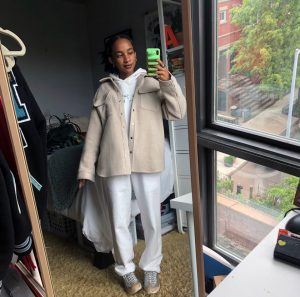
“One important life lesson for me has been that comparison is the thief of joy.”
Akua Kwakwa ’20 studied Fashion Design Management at Cornell and had been looking forward to having her family help with the move from Ithaca to NYC after she completed her degree. “I had been counting on their help,” she says, “but Ghana was on a strict lockdown at the time, so there was no chance they could make it.”
Fortunately, Akua lived with three close friends who helped her with the big move. “I just made sure to take the move step by step, and I made many lists,” she says, adding, “It was comforting to know we were all in similar situations.”
Akua worked part-time as a customer service representative until she was able to find a full-time position in her field. She says that Cornell Career Services was helpful with her job search. “Their advising services were really helpful in making the transition, especially in getting me thinking about things to ask prospective employers,” she says.
In March 2021, she began a job working as a studio manager at a new space called Swift Studios, located in Manhattan. Akua explains that clients rent one of their six studio spaces to do photo or video shoots, create content, or host events. “I wanted something full-time and with more benefits and opportunities, and I’m really happy with where I am now,” she says.
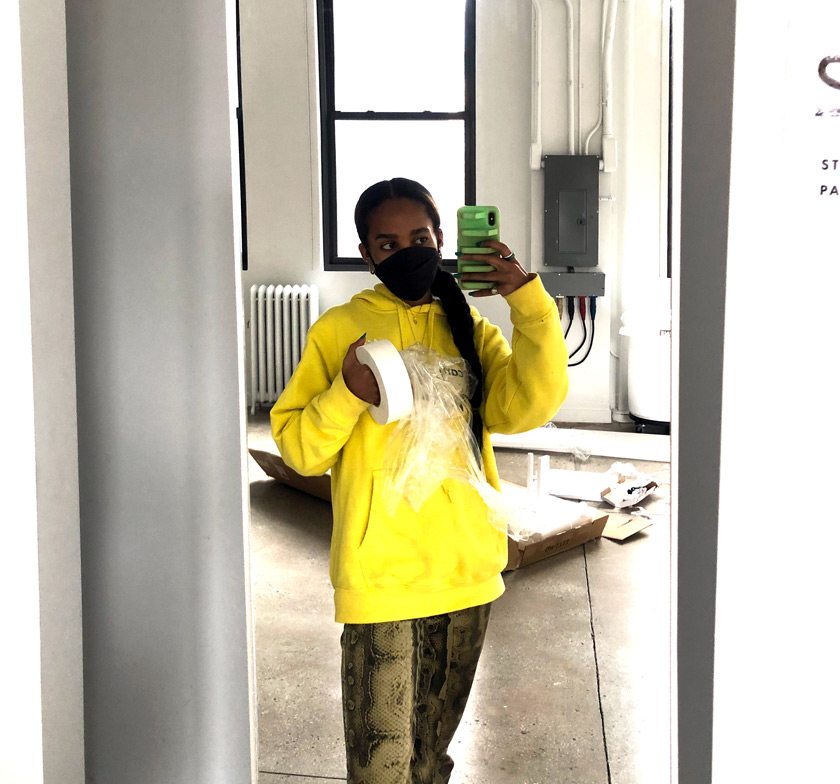
She is grateful to Cornell for the friendships she made and for “facilitating the community I was able to form,” she says. “I have a great social bubble I spend a lot of time with, so that’s been excellent,” she adds.
Now that the weather has warmed and pandemic restrictions have eased, Akua has taken advantage of the opportunity to do some window shopping. “I have really missed the feeling of walking around stores in a really leisurely way, so I’ve been doing that a lot,” she says. She’s been exploring the city, visiting The Green, a new art installation outside Lincoln Center, the High Line, and meeting friends after work in Washington Square Park. “Often we don’t have specific plans,” she says, “but I like anything that allows me to enjoy the good weather while it’s here.”
Akua hasn’t seen her boyfriend, who lives in Toronto, since March, so she’s looking forward to reuniting with him soon. “So many important things have happened to us both since then, that I’d love to celebrate with him,” she says.
In the meantime, Akua keeps in close touch with her family, and she’s been enjoying ebooks from the Cornell Library. She says that “friends, and books, and family” helped her to survive the pandemic and sustain herself over the past year.
“One important life lesson for me has been that comparison is the thief of joy,” Akua says. “I think people around this age can get really caught up in wanting to compete, even if we don’t acknowledge it outwardly. Moving away from that has been so helpful for me and better allows me to live my own life fully,” she says.


